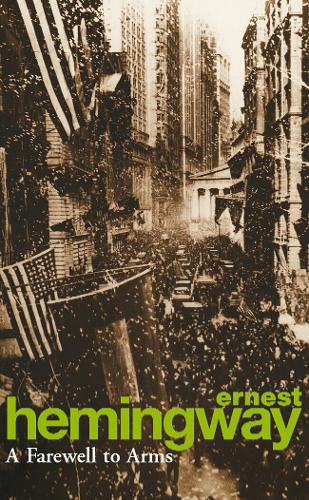
A Farewell to Arms
(Paperback)
Available Formats
Hardback
Published: 28th May 1993
Paperback
Published: 9th May 1997
Paperback
Published: 15th September 2022
Hardback
Published: 12th July 2016
Paperback
Published: 2nd December 2013
Publishing Details
A Farewell to Arms
By (Author) Ernest Hemingway
Cornerstone
Arrow Books Ltd
9th May 1997
18th August 1994
United Kingdom
Classifications
General
Fiction
Modern and contemporary fiction: literary and general
813.52
Physical Properties
Paperback
304
Width 111mm, Height 177mm, Spine 19mm
168g
Description
In 1918 Ernest Hemingway went to war, to the 'war to end all wars'. He volunteered for ambulance service in Italy, was wounded and twice decorated. Out of his experiences came A Farewell to Arms. Hemingway's description of war is unforgettable. He recreates the fear, the comradeship, the courage of his young American volunteer and the men and women he meets in Italy with total conviction. But A Farewell to Arms is not only a novel of war. In it Hemingway has also created a love story of immense drama and uncompromising passion.
Reviews
Flawless... such mastery of narrative, imagery and feeling, the prerequisites for great prose * Guardian *
It seems such simple and straightforward language, but it isn't. The first chapter of A Farewell to Arms is only two and a bit pages but there is almost every variety of sentence structure. It is incredibly artful writing, and part of the art is disguising that it is artful * Guardian *
There is something so complete in Mr. Hemingway's achievement in A Farewell to Arms that one is left speculating as to whether another novel will follow in this manner, and whether it does not complete both a period and a phase...crisply natural and convincing * Guardian, 1929 *
A novel of great power * Times Literary Supplement *
Essential Hemingway...a gripping account of the life of an American volunteer in the Italian army and a poignant love story * Daily Express *
Author Bio
Ernest Miller Hemingway was born in Chicago in 1899 as the son of a doctor and the second of six children. After a stint as an ambulance driver at the Italian front, Hemingway came home to America in 1919, only to return to the battlefield - this time as a reporter on the Greco-Turkish war - in 1922. Resigning from journalism to focus on his writing instead, he moved to Paris where he renewed his earlier friendship with fellow American expatriates such as Ezra Pound and Gertrude Stein. Through the years, Hemingway travelled widely and wrote avidly, becoming an internationally recognized literary master of his craft. He received the Nobel Prize for Literature in 1954, following the publication of The Old Man and the Sea. He died in 1961.
